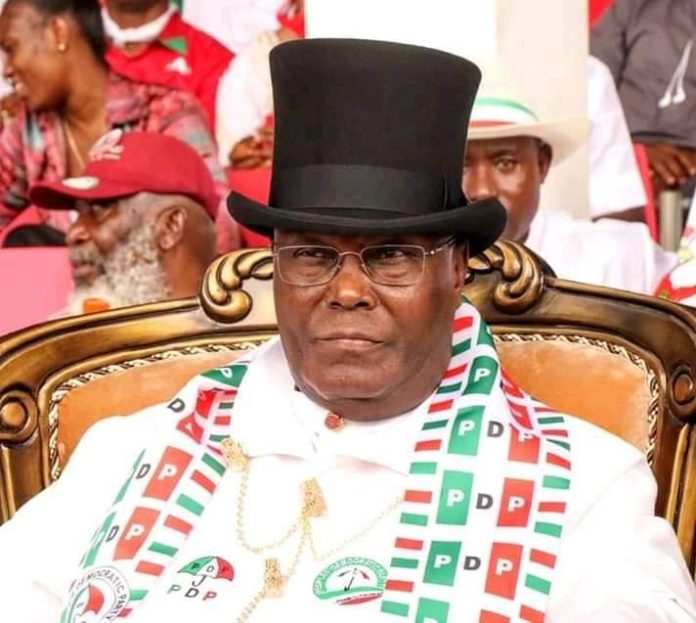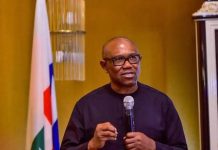The Peoples Democratic Party (PDP) and its presidential candidate Alhaji Atiku Abubakar are unsure of what they want from the Presidential Election Petition Tribunal (PEPC), President Bola Tinubu has said.
President Tinubu, in his reply to Atiku and the PDP’s final address, said this explains their contradictory prayers.
The flagbearer of the All Progressives Congress (APC) was declared the winner of the February 25 election after scoring 8,794,726 votes.
Dissatisfied with the election outcome, the PDP and Abubakar, and Peter Obi, the Labour Party (LP) candidate, are challenging Tinubu’s victory.
According to the Electoral Act, the tribunal has 180 days to determine the petitions, meaning the court is expected to round off all its activities on or before September 16.
Replying to Atiku and his party’s final address, Tinubu observed that they were praying the court to void the outcome of the presidential election on the ground that he allegedly failed to secure 25 per cent votes in Abuja.
But in the same breath, the petitioners want to be declared winners despite scoring less than 25 per cent.
“One of the major reliefs being claimed by the petitioners, in one breath, is that the 1st petitioner (Atiku), who polled only 16.13 per cent of the votes cast at the FCT, is entitled to be returned as President of Nigeria.
“In another breath, the same petitioners are urging the court to nullify the election of the respondent (Tinubu) on the ground that the respondent, who polled a higher percentage of 19.76 per cent of the votes cast at the FCT did not score 25 per cent of the votes cast at the same FCT,” Tinubu said.
He added that having presented “contradictory and mutually exclusive positions before the court,” the petitioners had tacitly admitted that “it is unnecessary for any presidential candidate to poll 25 per cent of the votes cast at the FCT in order to be declared the winner of the presidential election, once he meets the Constitutional requirement of 25 per cent of the votes cast in 2/3rd of the states of the Federation and the FCT, “which, by the provision of Section 299 of the Constitution, is taken as the 37th state.
“This is aside from the fact that the petitioners have no grantable relief before the court.”
In the reply filed for the President by his team of lawyers, led by Chief Wole Olanipekun (SAN), he argued that the petitioners, in their final address, abandoned their petition by failing to urge anything on the court, as required.
According to him, such evidence of abandonment is reflected on pages 1 to 40 of the petitioners’ written address, particularly, page seven, “where four issues have been formulated, all concentrating on the whimsically alleged non-qualification or wrong return of the respondent, without any issue formulated urging the court to make any pronouncement in favour of the petitioners; and pages 36b to b38, where the summary of the entire address is done under four compartments, that is, (a), (b), (c) and (d), each of which relates to, or concerns the respondent, without any iota of supplication for, or on behalf of the petitioners”.
The President added: “What has been presented before the court is devoid of any relief, plea, request, prayer or entreaty for, or in favour of the petitioners.
“In fact, no single submission in the petitioners’ address has been made in aid of any entitlement or relief for the petitioners. “Arising from the foregoing, since none of the issues for determination seeks the court’s intervention that will lead to any judgment granting any relief for the petitioners, particularly, the 1st petitioner, and more particularly, in respect of his wish to be returned as President, or for a rerun election, etc., we submit that the resultant effect is that all those reliefs are deemed abandoned”May we advance this argument further, by parity of reasoning, founded on judicial precedents, that issues for determination must relate to grounds of appeal, and any ground of appeal from which no issue has been formulated, is deemed abandoned.”
He argued that thus, all reliefs or prayers in the petition, “purportedly evincing any supplication or prayer to the advantage of both petitioners are deemed abandoned or have become moribund or otiose.
“Even in the very unlikely or remote event that any of the issues formulated in the address is resolved in favour of the petitioners, it cannot translate to or eventuate the grant of any relief in their favour.
“The effect of this is that the petitioners are not praying the court for any benefit. Therefore, all the hype relating to the 1st petitioner’s claim to have won the election or to be declared as the winner, or for a rerun election between the respondent and the 1st petitioner, etc, are deemed abandoned and all that remains of the entire case, is a shell or figment.
“May we submit that no petitioner or party is allowed to contest or ventilate any claim before a court which does not confer any benefit or utilitarian advantage to him. No party or individual is also allowed to pursue the type of cause being presented by the petitioners, as now revealed in their final written address, where all they seek is the ouster of the respondent, without more.
“In plain and succinct language, it has now become manifest that the petitioners’ action is not only abusive of the processes of court but also very academic.”
President Tinubu contended that Atiku and the PDP failed to respond to the various submissions in his final written address, a failure, which in law, amounts to admittance.
He said: “In the respondent’s address, several fundamental and constitutional issues have been raised in respect of the petitioners’ case, showing that what the petitioners have presented before this honourable court is non-sequitur (illogical), and throughout the address of the petitioners, they offered no response to them.
“It is trite that when one party makes a submission on a vital issue of law, and the other party (adversary) fails or refuses to respond to same, that other party is deemed to have admitted to the submissions of his adversary.
“All the allegations and evidence presented by the petitioners regarding the purported non-qualification of the respondent to contest the election go to no issue, as the petitioners did not plead any of these facts in their petition, particularly, paragraph 146 of the petition, which simply reads thus: ‘Ground four: Non-qualification’ (without any further pleading or supply of any fact).”
In his view, all evidence relating to the said allegations should be expunged from the records of the court, because evidence in respect of facts not pleaded go/goes to no issue.
He added: “The petition itself is improperly constituted, to put it mildly, as it challenges results of the election in several states won by the candidates of other parties, including the South Eastern states, Lagos, Plateau, Edo, Delta, FCT, etc, where Labour Party won and Kano State, where the candidate of the New Nigerian Peoples Party (NNPP) won, without joining the said parties and their candidates as parties to the petition.
“The petitioners also challenge the results of the election in states where they won, including Adamawa State, where the 1st petitioner comes from.”
President Tinubu also faulted the petitioners for citing judicial authorities that, in his view, do not support their case.
He said: “In paragraph 5.18 of their address, petitioners have surprisingly cited Oyetola & Anor. v. INEC, a case which is not in any way helpful to them, but further buttresses the respondent’s contention of the inconsequentiality of INEC’s alleged inability to transmit electronically.
“On page 26 of the said judgment, the apex court held thus: ‘In any case, the appellant’s two witnesses testified that on the spot electronic transmission of results from the BVAS may, in some instances, be frustrated by lack of internet connectivity, BVAS battery failure and error in pressing the ‘send button’ of the BVAS.
“So, even in the context of the case they presented, the appellants have shown, in their pleadings and evidence, that the BVAS cannot be a complete and accurate record of the number of voters accredited.”
He also faulted the petitioners’ reliance on the European Union Election Observation Mission, Nigeria, 2023, final report, which is unsigned, arguing that “the law is well settled that an unsigned document is of no utilitarian purpose or value.”
The President added: “Unlike the petitioners, who are in the habit of flaunting unsigned documents, including reports, the respondent tendered the ECOWAS Report (Exhibit RA21), duly signed and dated, commending the presidential election and concluding that it was in substantial compliance with the enabling statute.
“Therein, it was clearly stated that: ‘The Mission commends the speed and transparency in the collation of electoral results.’ (see page 10 of Exhibit RA21)
“Despite the hue and cry of the petitioners and notwithstanding the mountain of abuses and tantrums heaped on the respondent by the petitioners (for daring to defeat the 1st petitioner at the presidential election), the petitioners have not made the slightest of efforts to suggest any figure, in terms of votes due to the 1st petitioner as a result of the conjectured non-compliance.
“Clearly, it is an assumption, which evaporates so quickly, much like the case of the petitioners, the figure(s) lie/lies in ‘the cloud.’”
President Tinubu further argued that the contention by Atiku and the PDP that a candidate must score 25 per cent of votes in the FCT to be declared a winner of the presidential election was based on their erroneous impression that the Constitution provides or mandates that the respondent must score one-quarter of the total votes cast at the FCT.
“Without any prevarication, it is our submission that the said issue is misleading and has been couched out of a total misapprehension of the clear provision of Section 134(2}(b) of the Constitution, which talks of one-quarter of the votes cast in each of at least two-thirds of all the states in the federation and the Federal Capital Territory, Abuja.
“In other words, the words ‘one-quarter’ and ‘two-thirds” are taken together and not separately, whether or not the petitioners agree that the FCT, by virtue of section 299 is taken as the 37th state, or by their own wrong interpretation, that the FCT, is a special entity that should be conferred with a veto vote over all the states of the federation,” he said.
President Tinubu urged the court to discountenance the submissions of the petitioners, describing them as meddlesome interlopers.
He added that “by their final written address, it has been vividly demonstrated that they have only come to waste the precious judicial time and space.
“Despite this, one is amazed that the petitioners still have the inclination to bandy Lord Denning’s dictum in Packer v. Packer, particularly, the phrase of the Law Lord, to the effect that ‘if we never do anything which has not been done before, we shall never act anywhere,’ when, in actual fact, and throughout their address, all the petitioners are chasing, is the ouster of the respondent, without seeking an ounce of relief for themselves.
“Packer v. Packer was in respect of custody of a child born before marriage: there was a petitioner, who asked for reliefs; unlike in this matter, where the petitioners have predicated their petition on the Electoral Act, which places a strict burden on them, just like any other Electoral Act in the world.
“Unlike In Packer v. Packer, the petitioners herein have not asked for anything or any relief, as earlier highlighted.
“In Packer v. Packer, Lord Denning was not saying or suggesting that the mandate or plebiscite of the people, as given or demonstrated by them through the ballot box can or should be thwarted through a petition of this nature that is lacking in merit, substance and bone fide. The dictum has no doubt, been quoted out of context and season.”
The Nation









